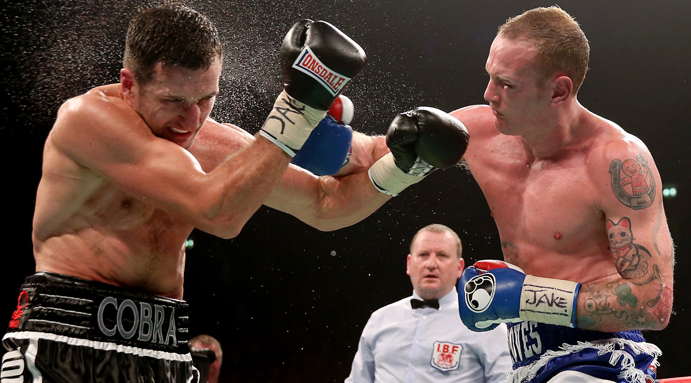
Carl Froch and George Groves rematch is a quiet psychological war
Posted on - May 19 Monday, 2014
Groves has kept up the sniping for the fight at Wembley but Froch, after seeking help, seems much calmer this time
Two weeks out from Wembley and most fight fans still can't be sure if Carl Froch's hardness and experience will be too much for the eccentricity of his young challenger George Groves.
What separates this fight from any other major boxing occasion is the degree to which Groves has made it a mental war. He set the agenda of mind games in the first fight brilliantly and very nearly got a result. He has decided to stick with that strategy: but is it working?
Tris Dixon, the editor of Boxing News, spoke to both fighters over the past week and, in his latest column, says: "Froch was calculated, determined and resolute; Groves crafty, sharp and ambitious."
It is hard to think of a more perfect contrast of styles and attitudes in a recent big British fight. We can take for granted both will be in the best physical shape, but the key to the result will be how they cope with the pressure, and I detect a major change in Froch, the older fighter by 11 years.
I've spent a good amount of time with them recently and it is clear that Froch has benefited from the regular talks he has been having at his training base at the English Institute of Sport with the resident sports psychologist. Some see this as a sign of weakness. Certainly Groves does. But is it? I think it shows admirable self-awareness and honesty to talk openly about coping with the pressure of such a huge occasion. It is the very antithesis of mind games.
"I couldn't even say his name before," Froch said last week. "I can say it now without it winding me up. I let him get under my skin and it affected my performance in a very negative way. That will not be happening again."
Groves has kept up the psychological sniping and is convinced he can get to Froch again. "He really needs to see a psychiatrist," he said when Froch revealed he was talking to the psychologist. "There's really nothing that can help him. He's not coping."
I am not sure. Froch is coping far better with the lead-up to this fight than he did last time, and that must be partly down to the support he is getting. It is not a weakness to admit a fault, especially in a sport as mentally taxing as boxing. The real mistake would have been to deny he had gone that route. Boxing is a game of rolling deceptions, from pre-fight boasts to feints and tricks in the ring – but, ultimately, there is no escaping the truth. As Joe Louis said before he fought Billy Conn in 1941: "You can run, but you can't hide."
This is not an American-style fight, with loud trash talking. When Adrien Broner and the other megaphone performers go to war they do so with all the subtlety of a brass band. And the louder the tune, the weaker the message, because it all disappears in a wall of familiar noise. The psychological war here is a quiet one, with little of the all-out abuse we have become used to. The digs are quick and clever.
Dixon concludes: "There is a very unusual, intriguing feel to this fight and the result is incredibly hard to call."
That it is. I'm still not sure who wins – although the combatants have no doubt.


